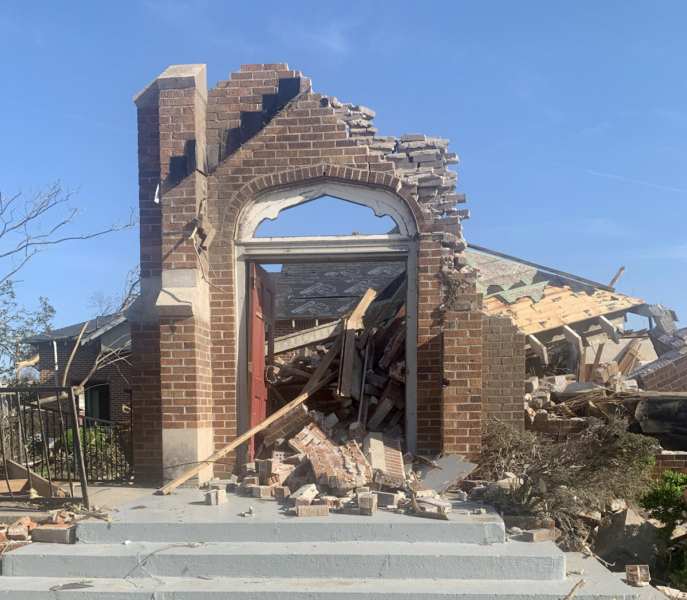Mississippi church finds glimmers of hope as it starts to recover after …
[Episcopal News Service] The Rev. Greg Proctor, rector of Chapel of the Cross in Rolling Fork, Mississippi, and his congregation are finding hope in the aftermath of the devastating tornado that destroyed the church building when it hit the small Mississippi Delta town on March 24.
The Chapel of the Cross in Rolling Fork, Mississippi, was destroyed by a tornado that struck the town on March 24. Photo: The Episcopal Church in Mississippi
Losing the church so close to the start of Holy Week, Proctor said, was an extra reminder of the basics of one’s faith. “I’ve told folks that we are Resurrection people, and that we will be resurrected from the kind of death we have experienced in the church,” he said. “We are an Easter people, and what better time to celebrate Easter … having experienced this loss? We will rise up and continue to be the Chapel of the Cross.” Much of the church was destroyed both by winds up to 170 mph and by the collapse of its three-story brick bell tower, which Proctor told Episcopal News Service fell vertically into the church.
The front wall still stands, without a roof or its stained-glass window. The congregation has been offered a place to worship this Sunday and for what Proctor thinks will be about a month at First Methodist Church in Cary, a few miles out of town. The congregation plans to return to worship in the parish hall, once it is repaired and electrical and water services restored.
The parish was founded in 1870, Proctor said, and the building itself was constructed in 1924 and is the only worship space current parishioners have ever known. “We are experiencing a death experience,” he said. “There is a loss there that we’re not going to be able to replace.” But he added, “We’re going to have to be born anew and be what we become and move forward.” The congregation is small, with an average Sunday attendance 14. And contrary to earlier reports, Proctor said, only two of his parishioners had damage to their homes.
Despite their small size, he believes that God is calling Chapel of the Cross members to be a force to help people in their community recover. “We are a people of faith, and it’s a gift from God, and we live out that faith daily,” he said. “And that’s what we’re doing right now, in so many ways we never thought we would.” But it’s hard for him to say what recovery will look like for the community with a population of about 1,900. Much of the downtown area was destroyed, he said, even though very few businesses were there any longer, and those that had moved out near Highway 61 also were lost. “Some will rebuild, but others are just gonna walk away, I’m afraid.
Time will tell,” he said. The Rev. Cathrine Halford, a deacon at St.
Columb’s in Ridgeland who serves as the disaster coordinator for the Episcopal Church in Mississippi told ENS that she has visited the town several times since the tornado hit, to hand out gift cards and just listen to those who wanted to talk. She thinks that regardless of what businesses do, most folks will rebuild in Rolling Fork. “This is their home,” she said, “and that’s where they want to stay. They’re going to be sure that they have a house to go back into, just to sleep in their own bed.”
But right now, “You can’t get through the town,” she added. Debris removal is in full swing with bulldozers and cranes, she said, and streets are lined with utility trucks from all over the Southeast working to restore power. Folks with large grills are providing meals, disaster organization RVs are everywhere and “even the Tide folks are there with washers and dryers,” she added.
Mississippi sees disastrous weather now almost year-round, Halford said, with tornados in the fall and spring and hurricanes in the summer, which means that relief agencies usually are ready to help quickly because they have so much experience. Episcopalians from other dioceses also contacted her immediately after the storm hit, offering money, gift cards and water, which she said will come in handy after relief organizations have left. Information about diocesan relief efforts is here.
One of Proctor’s first tasks is to provide the insurance company with a complete inventory of every item that was in the church, which he said is proving hard “because they aren’t right there in front of me.” And on April 4, he and church leaders will meet with an architect to see what, if anything, from the existing church structure can be saved and what possibilities exist for building on the same footprint. “We just don’t have any idea what we’re facing with regard to that,” he said, but he doubted they would be able to replicate the building they lost, which was built of stone and brick.
Cabinets in the sacristy of the Chapel of the Cross in Rolling Fork, Mississippi, helped silver and brass items escape damage from the tornado that destroyed the church on March 24. Photo: Cathrine Halford The church’s altar, as well as all the silver communion vessels and most of the brass items came through the storm unharmed, since they were on the opposite corner of the building from the bell tower.
They also found that the bell had survived its fall into the nave. One of the church’s 17 stained-glass windows also was left intact – a new one, installed just two weeks ago in the parish office to honor the oldest living member of the congregation. Proctor said they will dedicate it this Sunday as planned, and then cover it with plywood so it won’t be damaged as debris removal and eventual construction take place.
And on March 29, the baptismal font was found under the massive pile of bricks from the bell tower collapse. People dug through the bricks with their hands, aided by a backhoe that moved some of the larger debris, and they found the old marble font, intact with just a few chips, at the bottom of the pile, Proctor said. Proctor is aware of the long road ahead for his church and its members, who he said were experiencing a variety of emotions. “We have some people who are very pragmatic and say we have to take it as it is and move on.
Others are a little more sentimentally attached to the old building and are in mourning, some, and in shock, some,” he said.
– Melodie Woerman is a freelance writer and the former director of communications for the Episcopal Diocese of Kansas.







